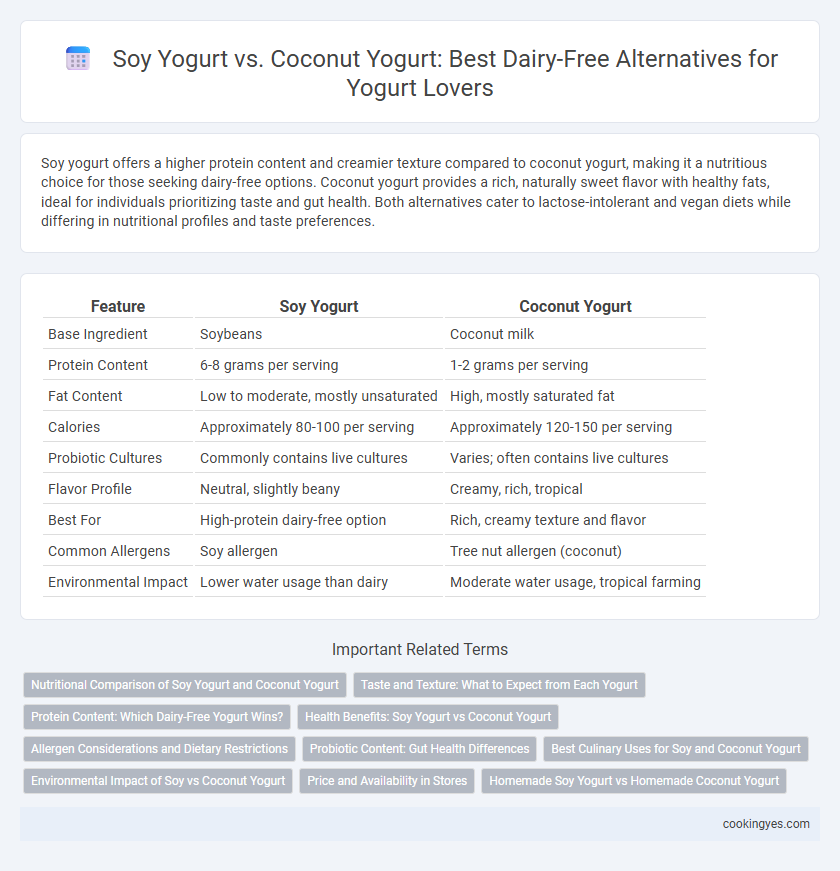Soy yogurt offers a higher protein content and creamier texture compared to coconut yogurt, making it a nutritious choice for those seeking dairy-free options. Coconut yogurt provides a rich, naturally sweet flavor with healthy fats, ideal for individuals prioritizing taste and gut health. Both alternatives cater to lactose-intolerant and vegan diets while differing in nutritional profiles and taste preferences.
Table of Comparison
| Feature | Soy Yogurt | Coconut Yogurt |
|---|---|---|
| Base Ingredient | Soybeans | Coconut milk |
| Protein Content | 6-8 grams per serving | 1-2 grams per serving |
| Fat Content | Low to moderate, mostly unsaturated | High, mostly saturated fat |
| Calories | Approximately 80-100 per serving | Approximately 120-150 per serving |
| Probiotic Cultures | Commonly contains live cultures | Varies; often contains live cultures |
| Flavor Profile | Neutral, slightly beany | Creamy, rich, tropical |
| Best For | High-protein dairy-free option | Rich, creamy texture and flavor |
| Common Allergens | Soy allergen | Tree nut allergen (coconut) |
| Environmental Impact | Lower water usage than dairy | Moderate water usage, tropical farming |
Nutritional Comparison of Soy Yogurt and Coconut Yogurt
Soy yogurt offers higher protein content, ranging from 6 to 8 grams per serving, compared to coconut yogurt, which typically provides 1 to 2 grams. Coconut yogurt contains more saturated fats due to its coconut milk base, while soy yogurt boasts a better balance of unsaturated fats and essential amino acids. Both options are often fortified with calcium and vitamin D, but soy yogurt generally delivers higher levels of iron and B vitamins.
Taste and Texture: What to Expect from Each Yogurt
Soy yogurt typically offers a creamy texture with a mild, slightly bean-like flavor that closely mimics traditional dairy yogurt, making it popular for those seeking a familiar taste. Coconut yogurt provides a richer, thicker texture with a distinct tropical flavor and subtle sweetness, appealing to those who prefer a more indulgent and exotic alternative. Both options deliver probiotics and nutrients but vary significantly in taste and mouthfeel, influencing personal preference and culinary use.
Protein Content: Which Dairy-Free Yogurt Wins?
Soy yogurt typically outperforms coconut yogurt in protein content, offering around 6-8 grams of protein per serving compared to coconut yogurt's 1-2 grams. This significant difference makes soy yogurt a preferred choice for those seeking higher protein intake from dairy-free options. Choosing soy yogurt supports muscle maintenance and satiety better than coconut-based alternatives.
Health Benefits: Soy Yogurt vs Coconut Yogurt
Soy yogurt provides high-quality plant-based protein and is rich in isoflavones, which support heart health and may reduce inflammation. Coconut yogurt offers medium-chain triglycerides (MCTs) that can boost energy and promote fat metabolism, alongside beneficial probiotics for gut health. Both alternatives are dairy-free, but soy yogurt tends to deliver more protein, while coconut yogurt is often lower in calories and rich in healthy fats.
Allergen Considerations and Dietary Restrictions
Soy yogurt often contains allergens like soy protein, which can trigger reactions in individuals with soy allergies, while coconut yogurt is free from soy but may cause issues for those with tree nut sensitivities due to its coconut base. Both soy and coconut yogurts cater to lactose-intolerant and vegan diets, but careful label reading is essential to avoid added allergens or cross-contamination. Choosing between soy and coconut yogurt depends on individual allergy profiles and specific dietary restrictions, ensuring safe and suitable dairy-free alternatives.
Probiotic Content: Gut Health Differences
Soy yogurt typically contains higher levels of live probiotics such as Lactobacillus and Bifidobacterium strains, promoting better gut microbiome diversity and digestion support compared to coconut yogurt. Coconut yogurt, while rich in medium-chain triglycerides (MCTs) beneficial for metabolism, often has fewer probiotic cultures due to its lower protein content and fermentation challenges. Choosing soy yogurt can enhance gut health more effectively by providing a robust source of beneficial bacteria essential for balanced intestinal flora.
Best Culinary Uses for Soy and Coconut Yogurt
Soy yogurt offers a creamy texture and neutral flavor ideal for savory dishes like salad dressings, dips, and marinades, enhancing umami notes in recipes. Coconut yogurt provides a rich, naturally sweet taste, making it perfect for smoothies, desserts, and tropical fruit parfaits where its coconut flavor complements other ingredients. Both yogurts serve as excellent dairy-free bases, with soy yogurt excelling in high-protein applications and coconut yogurt favored for its healthy fats and distinct aroma.
Environmental Impact of Soy vs Coconut Yogurt
Soy yogurt generally has a lower environmental impact compared to coconut yogurt due to the higher land efficiency and lower water consumption of soybeans versus coconuts. The cultivation of coconuts often involves tropical rainforests, leading to concerns about biodiversity loss and habitat disruption. Soy yogurt production contributes less to greenhouse gas emissions and deforestation, making it a more sustainable option for dairy-free alternatives.
Price and Availability in Stores
Soy yogurt typically offers a more affordable option compared to coconut yogurt, making it a budget-friendly choice for dairy-free consumers. It is widely available in most grocery stores and health food markets, ensuring easy access for shoppers. Coconut yogurt, while often pricier, can be found in specialty stores and some mainstream supermarkets, but its availability is generally more limited than soy-based alternatives.
Homemade Soy Yogurt vs Homemade Coconut Yogurt
Homemade soy yogurt offers a high-protein, creamy texture similar to traditional dairy yogurt, making it a popular choice for those seeking rich nutrition in dairy-free options. Homemade coconut yogurt, rich in healthy fats and with a naturally sweet, tangy flavor, provides a probiotic-rich alternative ideal for those prioritizing digestive health and a tropical taste. Both options require fermentation with live cultures, but soy yogurt typically requires a longer fermenting time to achieve optimal consistency compared to the faster-setting coconut yogurt.
Soy yogurt vs coconut yogurt for dairy-free alternatives Infographic

 cookingyes.com
cookingyes.com